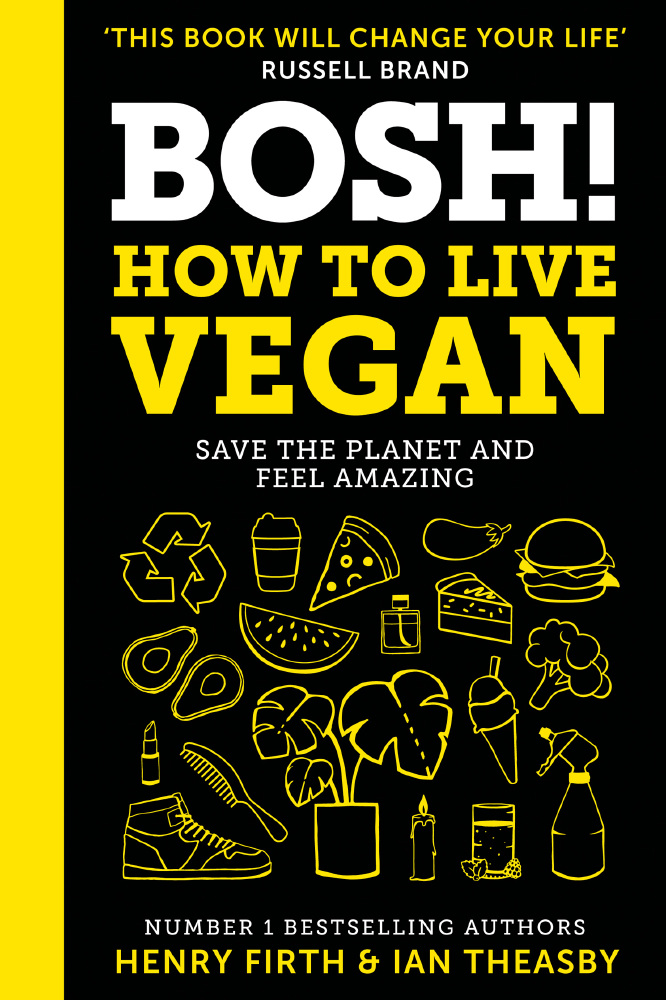The easiest way to get guaranteed animal-free clothes is to hunt down brands that specialise in vegan or cruelty-free clothing. You can easily find out this information online, since most vegan-friendly brands are keen to shout about it! There are some amazing choices available – it’s not all about long flowy shirts and dresses these days. Instagram is a great place to look too. Since some big names in Hollywood have started to follow plant-based eating, the fashion world has followed suit.

BOSH! How To Live Vegan
Browsing online, chatting in forums or asking your friends can all help you identify which brands are best for sourcing animal-free clothing. And of course, the best way is to simply walk into a store and ask the assistant to help you find vegan, plant-based clothes.
The other way to know if clothes are free from animals is to read the label and work it out yourself. To do this you need to know which materials are and aren’t vegan.
VEGAN-APPROVED FABRICS
Our clothes are basically all cotton. Whether it’s cotton, linen, denim or canvas, basically everything is derived from cotton. T-shirts, shirts, shorts, trousers, jeans, sandals, the lot.
Cotton is fairly water-intensive to produce, so not without its own carbon footprint, but at the end of the day we have to wear something! So it’s more important to be respectful of your clothes and make them last. Other than that, we have a few bits that are made from polyester – or a mix of cotton and polyester. Polyester is a plastic though, so make it last. And consider passing old clothes on when you are done with them, rather than throwing them away.
Previously, alternatives to animal-derived fabrics were all made from plastics, which are not great from a sustainability perspective. But now there are all manner of exciting alternatives available, and many more in development. We’re excited whenever we hear about new cruelty-free options. Here are some of our favourites:
Organic Fair Trade cotton – we love this stuff. We like to know that farmers are being looked after and that farming practices are as environmentally friendly as possible. Organic cotton uses fewer chemicals, pesticides and fertilisers to help the health of the soil. It’s also good to see that there are so many recycled brands available now.
Linen – this may make you think of an English gentleman abroad, but it’s a very eco-conscious fabric, especially if you source Fair Trade. Henry wore a white linen suit to a friend’s wedding in Greece, and felt like the Man from Del Monte. He said yes!
Hemp and bamboo – both are natural fabrics that usually don’t involve pesticides or harsh chemicals. Just watch out for rayon, which is made from bamboo but does involve a chemical-intensive production process.
Tencel® – this is super cool! It’s also known as lyocell and is made from wood celluose (literally wood pulp!). It has very eco-conscious production processes, as it reuses a lot of the water and chemicals.
There are also a load of brands making cool things out of fully recycled goods. You can find trainers, T-shirts, tracksuits and swimming costumes made entirely from recycled plastic bottles! We love getting our hands on bits like that, as they give you an extra spring in your step when you wear them. It’s hard to avoid telling people that you are literally wearing old plastic bottles!
Overall, when it comes to clothes, we think people should make their own choices. Add good-quality items to your wardrobe when you feel you need them. Decide how far you want to delve into the world of vegan stuff. It’s your call.
(p. 252 – 253)
BOSH! How To Live Vegan by Henry Firth and Ian Theasby is out now (HQ, HarperCollins).

